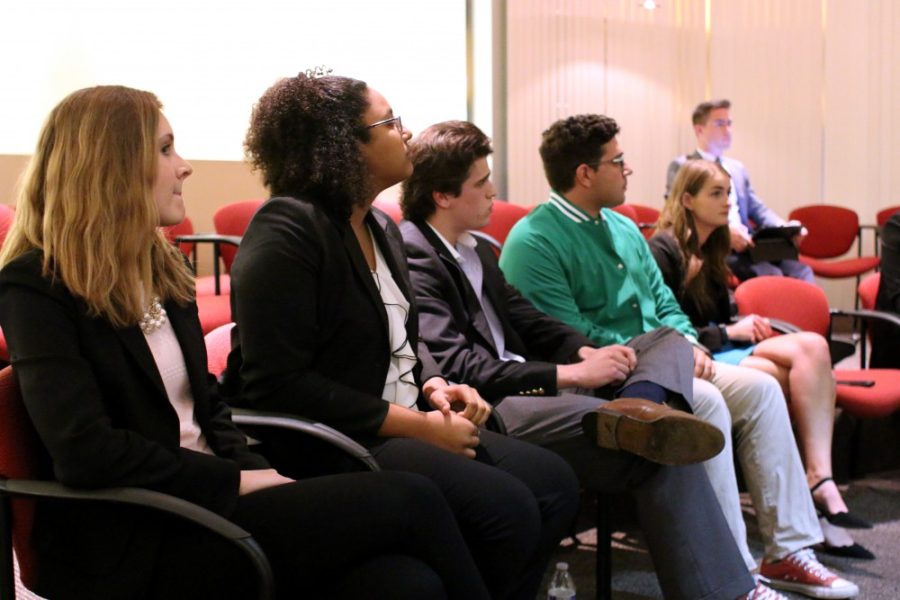The Associated Students of the University of Arizona held a debate for its presidential candidates on Sunday, Feb. 25 ahead of its general elections.
The debate was the last of four debates scheduled throughout February for ASUA elections. Candidates Anna Woolridge and Natalynn Masters were the two out of four presidential candidates that won the primary elections that ended on Wednesday, Feb. 21.
Before engaging in debate, Masters and Woolridge introduced themselves and their platforms.
Masters currently serves as ASUA diversity director. Her platforms are to continue diversity efforts such as working on the list of demands created two years ago by the Marginalized Students of the University of Arizona, combat sexual harassment on campus and to connect ASUA with the student body through updating their website and use of social media.
Woolridge serves as an ASUA at-large senator. Her platforms are to lower the ZonaZoo pass price in light of the new athletic fee, expand UA Campus Pantry hours, open-source textbooks, mandate cultural competency training for faculty and give ASUA access to the all-student listerv so that they can connect to the student body.
Masters and Woolridge were asked a series of questions by a panel featuring ASUA elections commissioner Marlon Freeman, current ASUA president Matt Lubisich, executive director of ZonaZoo Brian Goldstein, news editor for The Daily Wildcat Eddie Celaya, assistant dean of students Sherard Robbins and dean of students Kendal Washington-White.
Both candidates were asked questions specific to their platforms and the office they are running for. The candidates were also asked questions from the UA Multicultural Centers that were also asked at the vice-presidential forum on Friday, Feb. 23.
They were asked on how ASUA can aid in an effort to change Christopher Columbus Day to Indigenous People’s Day. This effort is currently being led by people in the Tucson community, as well as Native American student groups at UA.
For Woolridge, a lot of it is education about how native tribes work and that UA sits on native lands, as well as what it means.
“That’s necessary for the student body president to know so that when they are having those conversations with administration, they can help facilitate that,” Woolridge said.
For Masters, the first actionable step would be to let the community know where UA stands on the matter.
“I think the biggest statement the university can make is releasing a statement acknowledging the fact that we’re not going to celebrate Columbus Day on our campus,” Masters said.
The two were also asked how they would work to include marginalized communities in opportunities like study abroad and alternative breaks. The goal would be to allow these communities–whether race or financial status–to participate in these learning experiences.
RELATED: ASUA vice presidential candidates debate recap
Both agreed to making sure the opportunity is available to all students on campus through scholarships and promotion.
Woolridge and Masters were asked their perspectives on what biggest obstacle to obtaining equity–or fairness– on campus is.
For Woolridge, its lack of knowledge and privilege of certain communities that prevents equity being obtained.
“I think a lot of communities on campus don’t really understand each other, and therefore they either don’t communicate, they don’t communicate well, or they are not having good relationships,” Woolridge said.
For Masters, it’s a university-wide buy-in for equity, thereby placing an unfair burden on students to obtain equity for themselves.
“I think the biggest obstacle is that some areas on campus are afraid to have that conversations, and we kind of get students having to organize and put that work on their backs,” Masters said. “Rather than the administration and the university wanting to take that up.”
They were even asked on how they would help in UA’s effort to be designated a Hispanic-Serving Institution, meaning that 25 percent of its undergraduate enrollment is of Hispanic background, according to the U.S. Department of Education.
For Masters, its being knowledgeable on what the designation means for the university—eligibility for grant money from the government, according Washington-White.
RELATED: With primary results in, ASUA announces general election candidates
“I think the first part of that as ASUA president, working with different organizations, and Dean of Students, and administration to make sure that’s something that we’re applying for,” Masters said. “And that we’re using that money wisely when we’re awarded it.”
For Woolridge, it’s recruiting from the Tucson community, since it has a high Hispanic population.
“That starts with the University of Arizona recruiting locally and that gives them the opportunity to get an education,” Woolridge said.
General elections for all ASUA offices will be held from Tuesday, Feb. 27 to Wednesday, Feb. 28.
Follow Jordan Williams on Twitter









